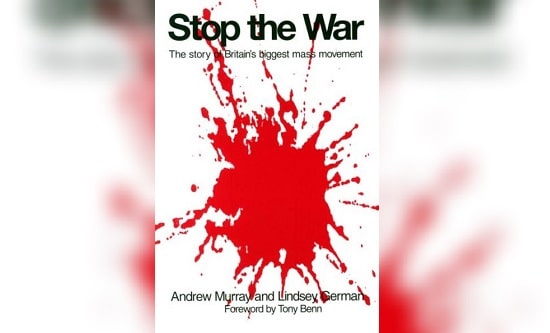
Stop the War: the story of Britain’s biggest mass movement
Andrew Murray and Lindsey German, with a foreword by Tony Benn.
Bookmarks, 2005, 276pp, £15.99
In post-modernist times the way to celebrate a political campaign is first to run it into the ground and then to publish a glossy book about how big it was. Remember the anti-globalisation campaign, a thriving mass movement until British ‘socialists’ parachuted in under the guise of Globalise Resistance and left it for dead? Well, this is the book for the Stop the War Coalition. Long before the occupation of Iraq is over, while the Iraqi resistance is still fighting on the streets, and Bush and Blair are lining up their future targets, the Stop the War leadership has switched to self-congratulation. For the record Andrew Murray writes for the Communist Party of Britain paper, Morning Star, and Lindsey German, formerly editor of the SWP’s Socialist Review, was lately Respect candidate in West Ham. If you think this means either of them are socialist, read on.
The foreword by Tony Benn measures out this book’s pretensions. In summary his argument is that all over the world peace campaigners of myriad political persuasions have come together to protest against ‘America’s war’ in Iraq. In Britain this movement was a masterpiece of non-sectarianism. No mention here of the British imperialism’s prosecution of the war, and certainly not a hint of the Labour Party’s role in government.
This is not surprising from the old Labour stalwart Benn, who has pledged life-long loyalty to the Labour Party, having served as a Minister under Harold Wilson in the 1960s signing away the Namibian people’s rights to their uranium in favour of Rio Tinto Zinc. Having accepted the imperialist shilling he is sticking with God and his pension. It is Benn who has proclaimed since the 1980s that Britain is now a colony of the US empire. For Benn it will always be an ‘American war’ on Iraq.
The 21st century leftists, however, have adopted new habits. Following the 11 September 2001 attack on the World Trade Centre, they have rediscovered imperialism. Short of being hit in the face with a wet fish, they could not do otherwise as the US and Britain waged war on Afghanistan and Iraq for transparently imperialist ends. But what is this imperialism they have rediscovered, having poured scorn on its existence only a few years before? It is a ‘new imperialism’ and it is the policy of a New Labour Party. The severing of the connection between the old imperialism and the new, and the old Labour Party and the new is fundamental.
Above all, these new leftists, who are not socialists or communists, deliberately fail to locate imperialism as fundamental to capitalism: the means by which the economic, political and military relations between states are governed. For them imperialism is a choice that New Labour – personified by Tony Blair – has taken alongside Bush. They argue, however, that ‘the doctrines of “liberal imperialism” have no great reservoir of support in contemporary Britain’, and that ‘New Labour has never sunk deep roots in the Labour Party’. Indeed Tony Blair has ‘no great reserves of political capital among Labour’s members, MPs or affiliated trade unions to draw on in the event of a major crisis or controversy’. The political agenda which follows from this is that wresting the Labour movement from the grip of New Labour/Tony Blair will do the trick.
How is this to be done? This book tells us their strategy. The Coalition leadership worried that they had gone too far by calling for the ousting of the Prime Minister. But reassuringly: ‘The Coalition itself was clear that “Blair must go” was not a call for overturning the government, (still less parliament)’. When the TUC Congress was ‘deceived’ into approving the occupation of Iraq, the STW Coalition were critical and actually said so(!). Breathe a sigh of relief, reader, despite this daring confrontation, the ‘Coalition’s trade union connection remained solid’. Of course the British trade union movement’s connections with imperialism remained solid too. Far from wresting the Labour movement from the grip of New Labour, the Coalition was leading the Stop the War movement – a spontaneous and mass anger against the war – into the arms of the warmongers and compromisers.
Since the massively successful Stop the War campaign, the Blairite Labour Party has managed to win the general election with a safe majority. By divorcing the old and the new, the British left can deceive itself that today’s betrayals are not fundamental to the British Labour movement. As communists we know better. While the Stop the War Movement remorse-lessly congratulates itself on building the biggest demonstration ever, the best this and the most that, and for putting ‘anti-imperialism at the heart of left-wing politics in Britain for the first time’ (if you ignore John Maclean, James Connolly, Sylvia Pankhurst et al, that is), we know that imperialism is not a policy but the devastating core of all economic and social relations. We will not defeat it by uniting with Labour, by covering up its betrayals, but by exposing Labour’s material relationship with imperialism and by uniting with all forces fighting against it.
We do not recommend this book.
Carol Brickley




